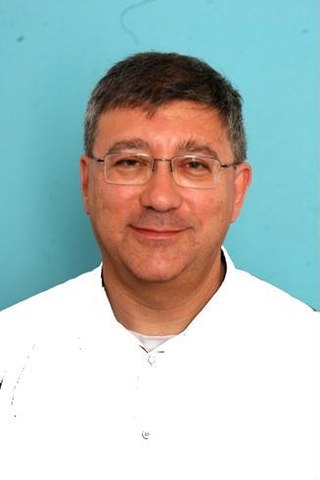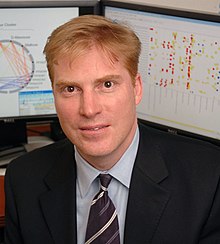The University of Texas Health Science Center at Houston (UTHealth) is a public academic health science center in Houston, Texas, United States. It was created in 1972 by The University of Texas System Board of Regents. It is located in the Texas Medical Center, the largest medical center in the world. It is composed of six schools: McGovern Medical School, The University of Texas MD Anderson Cancer Center UTHealth Graduate School of Biomedical Sciences, UTHealth School of Dentistry, Cizik School of Nursing, UTHealth School of Biomedical Informatics and UTHealth School of Public Health.
The cancer Biomedical Informatics Grid (caBIG) was a US government program to develop an open-source, open access information network called caGrid for secure data exchange on cancer research. The initiative was developed by the National Cancer Institute and was maintained by the Center for Biomedical Informatics and Information Technology (CBIIT) and program managed by Booz Allen Hamilton. In 2011 a report on caBIG raised significant questions about effectiveness and oversight, and its budget and scope were significantly trimmed. In May 2012, the National Cancer Informatics Program (NCIP) was created as caBIG's successor program.
Edward ("Ted") Hance Shortliffe is a Canadian-born American biomedical informatician, physician, and computer scientist. Shortliffe is a pioneer in the use of artificial intelligence in medicine. He was the principal developer of the clinical expert system MYCIN, one of the first rule-based artificial intelligence expert systems, which obtained clinical data interactively from a physician user and was used to diagnose and recommend treatment for severe infections. While never used in practice, its performance was shown to be comparable to and sometimes more accurate than that of Stanford infectious disease faculty. This spurred the development of a wide range of activity in the development of rule-based expert systems, knowledge representation, belief nets and other areas, and its design greatly influenced the subsequent development of computing in medicine.
Jack Y. Yang is an American computer scientist and biophysicist. As of 2011, he is the editor-in-chief of the International Journal of Computational Biology and Drug Design.

Jesse Menachem Ehrenfeld is an American physician. Ehrenfeld is President of the American Medical Association and Professor of Anesthesiology at the Medical College of Wisconsin. He is also a former Speaker of the Massachusetts Medical Society, where he was the youngest officer in the 228-year history of the organization. He is also a former Vice-President of the Massachusetts Society of Anesthesiologists. The inaugural recipient on the NIH Sexual and Gender Minority Research Award from the NIH Director, Ehrenfeld has been recognized for his contributions to advancing health equity. A 2008 recipient of the AMA Foundation Leadership Award, Ehrenfeld is a researcher in the field of biomedical informatics. Ehrenfeld's research interests include bioinformatics and the application of information technology to increase quality, reliability and patient safety. Ehrenfeld's work has led to the presentation of over 200 abstracts at national/international meetings and the publication of over 175 manuscripts in peer-reviewed journals. He serves as Editor-in-Chief of the Journal of Medical Systems, and is a fellow of the American Medical Informatics Association and the American Society of Anesthesiologists.
Translational research is research aimed at translating (converting) results in basic research into results that directly benefit humans. The term is used in science and technology, especially in biology and medical science. As such, translational research forms a subset of applied research.
Joe G. N. "Skip" Garcia is an American pulmonary scientist, physician and academician.
James J. "Jim" Cimino is an American physician-scientist and biomedical informatician. He is Professor of Medicine and Director of the Informatics Institute at the University of Alabama at Birmingham School of Medicine and Adjunct Professor of Biomedical Informatics at Columbia University. He is an elected fellow of the American College of Medical Informatics and a member of the National Academy of Medicine.
Carol Friedman is a scientist and biomedical informatician. She is among the pioneers the use of expert systems in medical language processing and the explicit medical concept representation underpinning the use of entity–attribute–value modeling underpinning electronic medical records.
Translational bioinformatics (TBI) is a field that emerged in the 2010s to study health informatics, focused on the convergence of molecular bioinformatics, biostatistics, statistical genetics and clinical informatics. Its focus is on applying informatics methodology to the increasing amount of biomedical and genomic data to formulate knowledge and medical tools, which can be utilized by scientists, clinicians, and patients. Furthermore, it involves applying biomedical research to improve human health through the use of computer-based information system. TBI employs data mining and analyzing biomedical informatics in order to generate clinical knowledge for application. Clinical knowledge includes finding similarities in patient populations, interpreting biological information to suggest therapy treatments and predict health outcomes.

Christopher G. Chute is a Bloomberg Distinguished Professor at Johns Hopkins University, physician-scientist and biomedical informatician known for biomedical terminologies and health information technology (IT) standards. He chairs the World Health Organization Revision Steering Group for the revision of the International Classification of Diseases (ICD-11).

Donald Allen Bror Lindberg was the Director of the United States National Library of Medicine from 1984 until his retirement in 2015. He was known for his work in medical computing, especially the development of PubMed. He won the 1997 Morris F. Collen Award from the American College of Medical Informatics.
Marylyn D. Ritchie is a Professor of Genetics, the Director of the Center for Translational Bioinformatics, the Associate Director for Bioinformatics in the Institute for Biomedical Informatics, and the Associate Director of the Center for Precision Medicine, at the University of Pennsylvania's Perelman School of Medicine.

Yuval Shahar is an Israeli professor, physician, researcher and computer scientist

tranSMART is an open-source data warehouse designed to store large amounts of clinical data from clinical trials, as well as data from basic research, so that it can be interrogated together for translational research. It is also designed to be used by many people, across organizations. It was developed by Johnson & Johnson, in partnership with Recombinant Data Corporation. The platform was released in Jan 2012 and has been governed by the tranSMART Foundation since its initiation in 2013. In May 2017, the tranSMART Foundation merged with the i2b2 Foundation to create an organization with the key mission to advance the field of precision medicine.

Lucila Ohno-Machado is a biomedical engineer and Deputy Dean for Biomedical Informatics at the Yale University School of Medicine. She is an elected member of the American Society for Clinical Investigation and the National Academy of Medicine.

Dean Forrest Sittig is an American biomedical informatician specializing in clinical informatics. He is a professor in Biomedical Informatics at the University of Texas Health Science Center at Houston and Executive Director of the Clinical Informatics Research Collaborative (CIRCLE). Sittig was elected as a fellow of the American College of Medical Informatics in 1992, the Healthcare Information and Management Systems Society in 2011, and was a founding member of the International Academy of Health Sciences Informatics in 2017. Since 2004, he has worked with Joan S. Ash, a professor at Oregon Health & Science University to interview several Pioneers in Medical Informatics, including G. Octo Barnett, MD, Morris F. Collen, MD, Donald E. Detmer, MD, Donald A. B. Lindberg, MD, Nina W. Matheson, ML, DSc, Clement J. McDonald, MD, and Homer R. Warner, MD, PhD.

Nicholas Pierino Tatonetti is an American bioscientist who is Vice Chair of Operations in the Department of Computational Biomedicine and Associate Director of Computational Oncology in the Cancer Center at Cedars-Sinai Medical Center in Los Angeles, California. His lab develops data mining approaches to understand clinical and molecular data.
Daniel Richard Masys is an American biotechnologist and academic. He is an Affiliate Professor of Biomedical and Health Informatics at the University of Washington.
Suzanne B. Bakken Henry is an American nurse who is a professor of biomedical informatics at Columbia University. Her research considers health equity and informatics. She is a Fellow of the New York Academy of Medicine, American College of Medical Informatics and American Academy of Nursing.








